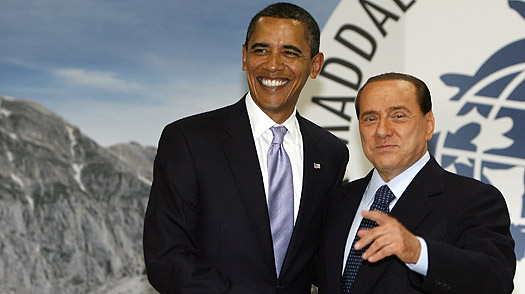
This week's Group of 8 summit has turned the world floodlights onto the often grinning mug of Italian Prime Minister Silvio Berlusconi, the flamboyant billionaire now famous around the globe for his one-liners, presumed private peccadilloes and eternally unresolved conflicts of interest.
Barack Obama's first meeting in Italy, however, was with the other face of Italian politics: President of the Republic Giorgio Napolitano, 84, a soft-spoken veteran of the political left. And perhaps it was inevitable that the praise Obama heaped on Napolitano made most think right away of Berlusconi, who has spent the past two months swatting away questions about his allegedly swinging private life. "I had heard of the wonderful reputation of President Napolitano as somebody who has the admiration of the Italian people not only for his long-standing service but also his integrity and graciousness," Obama said of the largely ceremonial head of state during a brief morning stopover in Rome. "And I just want to confirm everything I have heard about him is true."
And what, we can ask, has Obama been hearing about Berlusconi recently? About the Prime Minister's wife of 20 years saying in late April just before filing for divorce that her husband "frequents underage females"; about the photographs published by the Spanish daily El Pais of topless women and a nude man at his villa on the island of Sardinia; about accusations of high-paid prostitutes at Berlusconi's home in Rome on Nov. 4, the night of Obama's historic election victory.
After Berlusconi's rock-solid rapport with President Bush, based largely on his support of the war in Iraq, some have wondered if Obama might have less patience for this atypical ally.
But by the afternoon, following the opening round of G-8 talks on climate change and new ethical standards for global finance, Obama was shoulder to shoulder with a (mostly) somber-faced Berlusconi, touring the historic center of L'Aquila, which was decimated by an April 6 earthquake that killed 297 and left some 50,000 homeless.
As it was a few weeks ago when the Italian leader visited the White House, the body language was that of two best buds, with Berlusconi putting his arm around Obama's back to pose for pictures. At one point Berlusconi surprised his American counterpart by tugging on his elbow to position for photographers. Berlusconi clearly basked in attention meant for Obama, with hundreds of Italians lining the road, waving, cheering and holding up signs. "Yes We Camp," read one message: a play on the Obama campaign slogan and a reference to the thousands of earthquake victims still forced to live in tent cities.
Once the two leaders arrived at a downtown square, Berlusconi showed Obama a series of maps, illustrated in English, that showed which buildings can be salvaged and which are permanently crippled. Italians are hoping all of the G-8 countries will choose from a so-called "shopping list" of damaged heritage sites to help fund their rebuilding.
Berlusconi's last-minute decision to bring the three-day summit to L'Aquila, moving it from its original location on Sardinia to focus attention on the earthquake recovery, was the kind of unorthodox political gesture that can sometimes impress his international counterparts. But it is the other side of Berlusconi's unpredictable nature that increasingly dominates his image and that by some accounts has weakened his role as summit host.
Though the recent focus has been on his private life, Berlusconi's international image is colored by more than just bedroom allegations. He has continued to own Italy's major private television network and exerts great control over the media. An evening press briefing in L'Aquila, where many expected the recent criticisms to be raised, ended abruptly without him taking reporters' questions.
The 72-year-old Prime Minister is also famous — and perhaps fame is above all what he seeks — for his often impolitic comments. Among his recent remarks that stunned the world community came right after Obama's election, when he declared with a wide grin that the incoming America President was "young, handsome and well-tanned." An avalanche of criticism didn't stop Berlusconi, who insists that his remark was meant to be playful, from paraphrasing it again before his Washington trip last month.
Obama, by all accounts, seems unperturbed by this and other Berlusconi missteps. The U.S. Administration says the historically stellar bilateral relations with Italy will not be affected by Berlusconi's extracurricular distractions, and a White House official made a point on Wednesday of praising the Italian prep work for the G-8, following press reports that the hosts had dropped the ball.
Ever pragmatic, Obama appears to be more concerned with what Berlusconi does in Afghanistan (where Italians have one of the strongest troop contingents) and what he says about Iran (where his softer approach is in line with the White House) than what he does and says in Italy.